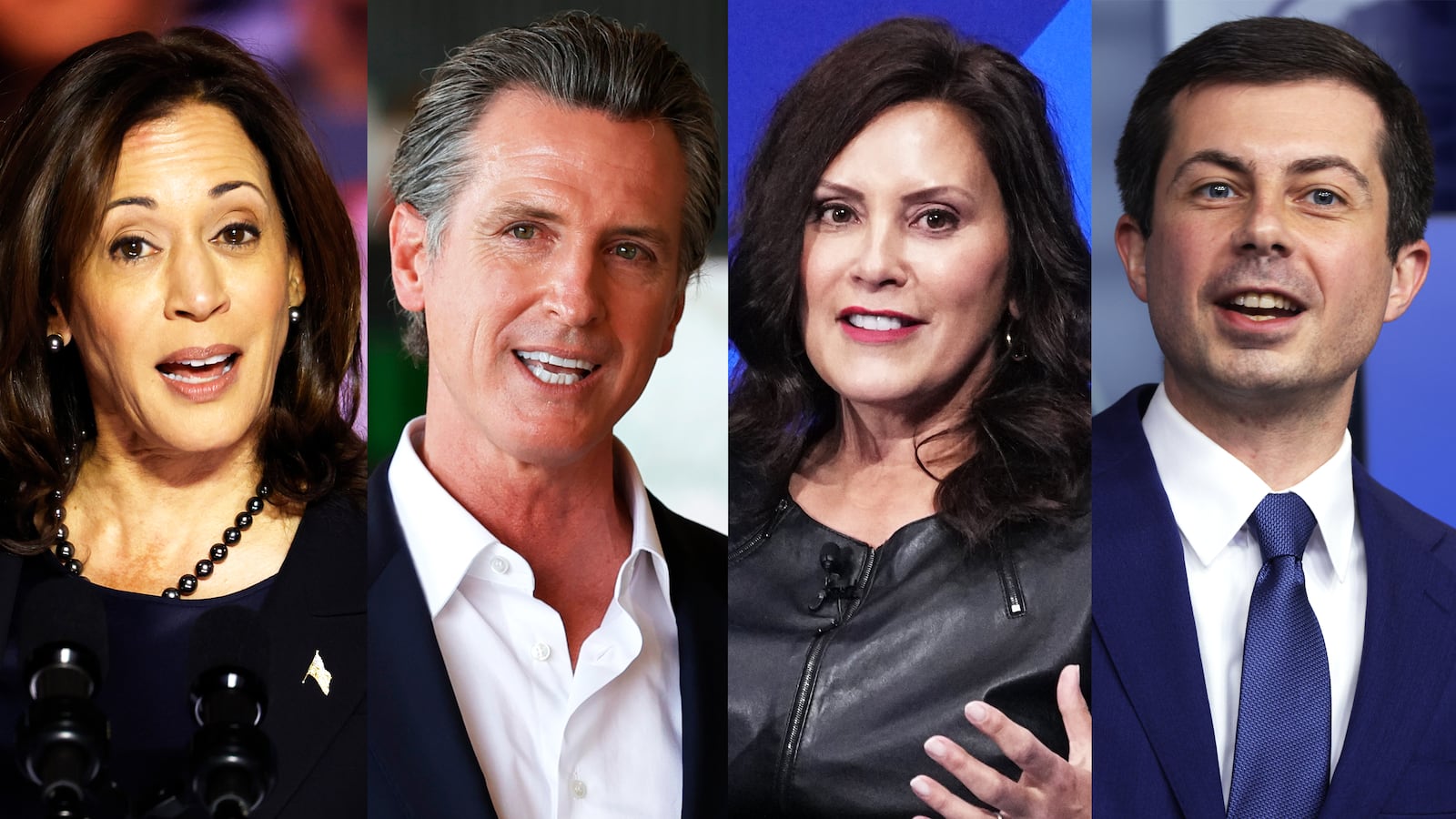According to New York Times columnist Bret Stephens, writing Thursday, Joe Biden has one option if he wants to secure a “courageous, honorable and transformative legacy” from his time as U.S. president: He should choose not to run for re-election in November.
Just five months out from election day, Stephens, a “Never Trump” conservative, listed the dizzying challenges facing Biden at home and abroad as he runs to keep from the White House “a felonious adversary who three years ago incited violence to overturn an election.”
Stephens did not directly mention Biden’s age, 81, or ceaseless speculation that the president is too old for the office. But the question of age is undoubtedly Biden’s biggest campaign problem and Stephens did write that the president’s “feeble” leadership renders him unequal to the great tasks facing the U.S., leaving him “with one option that can be a win for America and, ultimately, his place in history.”
“He can … cede the field to a Democrat who can win … and do the hard and brave things it will take to secure security and peace for the free world.”
“There’s still time, if only just.”
When contacted by The Daily Beast, neither the White House nor the Biden campaign chose to comment on Stephens’ column.
But say President Biden did listen to Stephens, and did decide that even so close to an election, to be a modern-day Cincinnatus—the Roman dictator who relinquished power, setting an example for George Washington—was the best thing he could do for his country.
Which Democrats might step into the breach?
Coastal Governors with TV Hair
Biden and Donald Trump haven’t debated yet but Gavin Newsom of California has, facing off with Florida governor Ron DeSantis on Fox News in December. Most thought Biden’s surrogate won, in part simply by acting and appearing more presidential than an opponent two months after giving up on his twitchily awkward Republican campaign and casting his lot with Trump. Widely held to be preparing a presidential run in 2028, the tall and handsome Newsom was also widely said to be running a “shadow campaign” this time, in case the Democratic nomination fell open. He denied it, of course, but at 56 and in his second term he has the experience, as well as the looks and manner, to make a case on the national stage quickly. In the debit column, as governor of a deep Blue state—attacked by DeSantis as some sort of feces-strewn woke hellscape—Newsom could expect ferocious opposition from centrists and Republicans both.
Phil Murphy of New Jersey has nothing like Newsom’s profile or presence (though he does have a new hairdo), but he is also a two-term governor with a solid record in a populous Blue state who might seem ready made to step into a gap. He’s 10 years older than Newsom but in U.S. politics today, 66 is practically spring chicken material. A former Goldman Sachs executive, Murphy might reassure Wall Street leaders now slinking back to Trump. He also has diplomatic experience, having served as ambassador to Germany under Barack Obama. He denied interest in the presidential nomination in 2024 … but dodged questions about 2028. He’d surely be interested if a vacancy suddenly arose.
Swing State Stars Who Get Shit Done
Gretchen Whitmer, governor of Michigan, is also in her second term. Considered for vice president when Biden ran and won in 2020, she shone through Covid and other challenges in a tough state—even amid a far-right plot to kidnap and possibly kill her. That episode and others have contributed to the 52-year-old’s national profile. When she does run, which most state and national observers expect in 2028, her pitch will inevitably focus on blue-collar qualities associated with her state: grit (or “True Gretch” as an imminent campaign biography awkwardly puts it), tenacity and a commitment to working-class voters. As Biden said when considering her for VP, Whitmer is one of a group of women Democrats think is ready to break the ultimate glass ceiling and enter the Oval Office.
In Pennsylvania, meanwhile, Josh Shapiro won election to the governor’s mansion in 2022 by beating Doug Mastriano, an extreme Republican pick. Shapiro, 50, is a former state representative and attorney general, in which role he, as his own biography puts it, “protected the right to vote and defended Pennsylvania’s election result [in 2020], winning in court dozens of times before and after Election Day.” In short, Shapiro would be a centrist pick with less governing experience than other executives but direct experience on the front lines of the fight against Republican election subversion and threats to democracy itself, a key theme of Biden’s campaign.
The Veep
Kamala Harris is of course Biden’s vice president and would thus have every right to expect a hearing from the Democratic faithful should the President choose to step down. The first woman and woman of color to be vice president, a former California attorney general and U.S. senator, she emerged from a list of serious contenders to seize that White House role. Her time in the job one of Franklin D Roosevelt’s veeps famously said wasn’t worth “a pitcher of warm piss” has of course been far from easy, but recent campaign outings have shown Harris’s immense strength when prosecuting a case—particularly in taking the fight to Republicans over threats to reproductive rights, abortion access chief among them. As Biden discovered in the first debate in 2019, when Harris attacks, the rhetorical blows keep coming. As voters discovered as that primary went on, retail politics is less of a strong point.
The Scholar
Wes Moore is another first-term governor in Maryland, a Democratic stronghold which nonetheless could play a role in the Senate going Republican this year, should the popular former GOP Gov. Larry Hogan persuade voters of his moderate appeal. Moore, a former Rhodes Scholar and author, occupies the same sort of centrist territory and has so far emerged from a particularly testing episode, the collapse of the Francis Scott Key bridge and the resultant effect on shipping at the Port of Baltimore, with his credentials as an executive enhanced. Like most of the other governors eyeing a White House run, Moore is of course thinking more of 2028 than 2024. He’s also younger than most, at 45, and has plenty of time.
Over the Capitol Hill?
Most Democratic energy on the Hill will be applied to trying to win back the House and attempting to hold the Senate. But as the saying goes, no U.S. senator ever looked in the mirror and failed to see a president staring back. Among senior members of that chamber, Bernie Sanders of Vermont has run two strikingly successful campaigns for the Democratic presidential nomination, efforts that did much to strengthen the progressive wing of the party. He is however older than Biden—82 now, 89 at the end of the next Senate term should he win re-election—and seems an unlikely choice for an electorate starkly concerned about the ages of Biden and Trump (who turns 78 on Friday). At 74, Liz Warren of Massachusetts, another progressive star, also seems unlikely to tilt for the White House again. Then again, unique circumstances might argue for unique actions: a promise to serve one term, say.
The Space Man and the Star Trek Fan
Among younger Senate Democrats, New Jersey senator and noted space opera enthusiast Cory Booker ran in 2020 and at 55 surely still sees himself as fit for higher office. Should a vacancy arise in the short term, Mark Kelly of Arizona could be a decent outside bet to make a surprise White House run. Not just popular and from a battleground state, the 60-year-old is a former U.S. Navy combat pilot and NASA astronaut and has direct links to the movement for gun reform, a key Democratic cause, through his wife Gabrielle Giffords, a former congresswoman who survived being shot in 2011.
The Mayor
Pete Buttigieg mounted a surprisingly strong challenge to Biden in the 2020 primary. Then, he was the mayor of South Bend, Indiana, mounting an insurgent campaign to be the first gay presidential nominee. Now he’s a seasoned government leader, transportation secretary in an administration that has seen strikingly little turnover or scandal—certainly compared to the Trump circus that came before—battle-tested by shipping and rail disasters in Baltimore harbor, in East Palestine, Ohio, and elsewhere. Another youngster in political terms, still just 42, the former U.S. Navy reservist is a confident public performer who has years on the national stage before him.
The Billionaire
Mark Cuban. This is not a joke. The star of ABC’s Shark Tank and part-owner of the Dallas Mavericks NBA team has flirted with politics for years, particularly since Trump took the stage as a belligerent voice from the business world, forever touting his billionaire status. Cuban has that status too but less of the belligerence and more of a commitment to sane centrism that saw him discussed as a possible candidate for No Labels before he disavowed the idea. Now 65, Cuban has said he has “no plans” to run in 2024.
Of course, should Biden somehow heed Bret Stephens and decide suddenly to step down, all plans everywhere will be torn up—and new ones quickly drawn.






